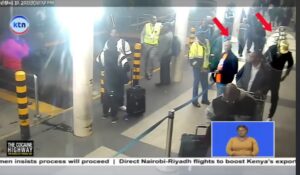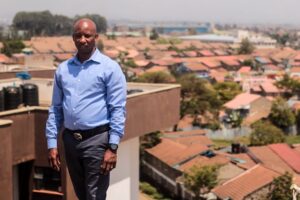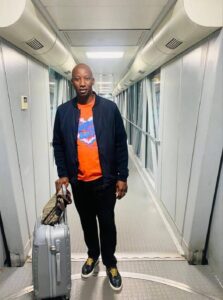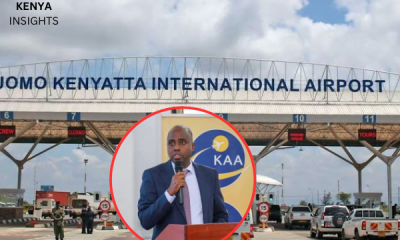Investigations
How a Cabinet Secretary’s Confidant, JKIA Insiders, and International Drug Lords Turned Kenya’s Gateway Into a Narcotics Superhighway
The Cabinet Secretary’s identity remains the explosive secret everyone knows but few dare speak aloud.

The truth is far more sinister than anyone imagined. What began as a routine arrest at London’s Heathrow Airport in May has unraveled into Kenya’s most explosive corruption scandal of 2025, one that reaches into the highest corridors of power and exposes Jomo Kenyatta International Airport as a compromised fortress where cocaine flows as freely as legitimate cargo.
At the center of this maelstrom stands a man known only as “Moha,” a figure so politically connected, so deeply embedded in Kenya’s power elite, that his very name sends tremors through law enforcement circles.
The former matatu tout turned political fixer, Mohamed Muamar alias Moha operates in the shadows as a trusted aide to a sitting Cabinet Secretary, a relationship that investigators believe has provided the protective umbrella under which Kenya’s cocaine highway has thrived.
The operation’s brazenness was captured in chilling clarity on CCTV footage from the night of May 13, 2025, when Jesse Bryan Da Mata Dos Santos, a 42-year-old British national, strolled through JKIA’s security checkpoints with a briefcase containing 20 kilograms of cocaine worth an estimated Sh100 million.
He was arrested the following day at Heathrow Airport with the drugs hidden in his luggage.
But it was not Dos Santos’s audacity that shocked investigators. It was how effortlessly he had been ushered through Kenya’s supposedly secure airport.
The footage tells a damning story.
Dos Santos did not slip through security; he was guided through it.
An accomplice wearing a yellow reflector jacket, an employee of a British Airways ground handling contractor, became his personal escort through restricted areas.
But there, clearly visible in the queue alongside the drug courier, stood Moha. Not hiding. Not lurking. Standing in plain sight, his presence a silent guarantee of safe passage.
The 7am raid on Moha’s Nyayo Estate home was theater, a performance designed to create the illusion of action while the real cover-up machinery churned behind closed doors.
Twenty plainclothes DCI officers descended with manufactured urgency, ransacking the property as terrified children watched their world torn apart.
They whisked Moha away to DCI headquarters on Kiambu Road, where DCI Director Mohammed Amin and Anti-Narcotics Unit boss Samuel Labisto subjected him to hours of questioning.
But here is where the script flips.
This was officially a “summons,” not an arrest. No handcuffs. No booking. No charges. Just questions and the chilling promise from sources inside the investigation that they were “profiling him,” examining his call logs and background to determine if he qualified as a “person of interest.”
The semantics matter. A summons means he walked out the same door he entered, free to report back to his powerful patron, free to alert the wider network that the walls might be closing in.
Who protects Moha?
Sources within both law enforcement and political circles describe him as “feared a lot in the streets,” a man whose rise from the rough world of matatu transport to the refined corridors of Cabinet-level power defies conventional trajectories.
His transformation speaks to something darker, a Faustian bargain where street cunning met political ambition and produced a figure who operates with seeming impunity.
His connection to the unnamed Cabinet Secretary is not merely professional; Moha reportedly functions as a family aide, embedded so deeply within the minister’s inner circle that separating his interests from those of his patron has become impossible.
The Cabinet Secretary’s identity remains the explosive secret everyone knows but few dare speak aloud.
Multiple sources across government and media circles have confirmed the connection, yet the name stays locked behind closed doors, protected by fear, political calculation, and the knowledge that exposing this particular official could trigger consequences far beyond a single scandal.
This is not a low-level minister caught in an embarrassing association.
This is a heavyweight, someone whose portfolio and political leverage make him effectively untouchable.
Dos Santos had made several trips in and out of Kenya using a tourist visa , a pattern that should have raised red flags throughout the immigration and security apparatus.
How many times had he walked through JKIA? How much cocaine had preceded this final, fatal journey to London?
The investigation has revealed a trafficking operation of staggering sophistication, one that required not just corrupt airport workers but systematic institutional failure or, more likely, systematic institutional complicity.
The cover-up is now in full swing, and it is breathtaking in its scope.
The Kenya Airports Authority, under Chairman Caleb Kositany, has gone into crisis management mode.
Case files are being quietly seized. Information is being compartmentalized and controlled.
A senior anti-narcotics detective stationed at JKIA, someone who should be central to any legitimate investigation, has instead fled the country.
His disappearance speaks volumes about what he knows and who he fears.
Inside KAA management, the strategy is simple and cynical: wait for the storm to die down.
No aggressive internal investigation.
No transparent accountability measures.
Just hunker down, manage the media cycle, and hope that Kenya’s notoriously short attention span moves on to the next scandal before any real damage is done.
It is the institutional equivalent of putting your fingers in your ears and singing loudly until the problem goes away.
But this problem is not going away. London’s Metropolitan Police have written to Kenyan authorities demanding comprehensive details on the investigation.
They want to know how Dos Santos operated so freely.
They want to understand the network that facilitated his movements.
They want names, and the name they likely want most is that of the Cabinet Secretary whose aide was caught on camera facilitating an international drug operation.
Kenya’s response? Silence.
Deafening, calculated silence.
No cooperation. No transparency. No answers.
Just the stone wall that always goes up when the powerful are threatened.
The Kenyan government’s refusal to engage with their British counterparts is not bureaucratic sluggishness. It is a deliberate strategy to run out the clock, to hope that London’s attention eventually wanes and the scandal dies a natural death from lack of oxygen.
The implications stretch far beyond one corrupt politician and his street-smart fixer. JKIA has been exposed as fundamentally compromised.
If a Cabinet Secretary’s aide can facilitate the movement of 20 kilograms of cocaine through Kenya’s primary international gateway, what else is moving through those corridors?
How many other Mohas exist within the system? How many other powerful patrons use their positions to guarantee safe passage for narcotics, weapons, contraband of every description?
The yellow reflector jacket has become this scandal’s most potent symbol.
That single piece of clothing, meant to identify legitimate airport workers, instead became the uniform of corruption.
It granted Dos Santos access to restricted areas.
It signaled to security personnel that the man in the reflector jacket and his companions were to be left alone.
It transformed JKIA from a security checkpoint into a narcotics expressway.
British Airways’ contracting of ground handling services has now come under intense scrutiny.
How thoroughly are these employees vetted?
What oversight exists to prevent airport access credentials from being weaponized by criminal networks?
The contractor connection suggests this operation had legitimate institutional cover, that the corruption was not just about bribing a few guards but about systematically penetrating and exploiting the airport’s operational structure.
The question that haunts every aspect of this scandal is simple: How high does this go? If Moha is the street-level operator and his Cabinet Secretary patron is the political shield, who else is involved? Are there other ministers? Other government officials? Military or intelligence figures who have turned Kenya’s strategic geographic position into a drug trafficking asset?
The investigation comprised of a multiagency collaboration , suggesting that elements within Kenyan law enforcement did attempt to build a case against Dos Santos and his network. But multiagency collaboration also means multiple opportunities for leaks, multiple points where political pressure could be applied, multiple places where the investigation could be derailed.
And derailed it has been, at least on the Kenyan side.
Dos Santos now awaits trial in London, where British justice will proceed regardless of Kenya’s diplomatic stonewalling.
But in Nairobi, the machinery of impunity grinds on. Moha walks free.
The Cabinet Secretary continues in his post. The senior detective who fled has not been named or pursued.
The KAA management team faces no consequences for their cover-up.
The system has absorbed this scandal the way it has absorbed countless others, by protecting the powerful and punishing anyone foolish enough to demand accountability.
The cocaine highway remains open.
That is the most terrifying conclusion from all of this.
Even with international attention, even with CCTV evidence, even with a British arrest and trial, the fundamental corruption that enabled Dos Santos to operate so freely remains untouched. The network survives.
The protections remain in place.
The next courier is probably already in the queue, guided through security by someone in a yellow reflector jacket, protected by someone with connections that reach into the Cabinet itself.
This is not just about drugs.
This is about a governing system so corroded by corruption that international criminal networks can purchase access to critical national infrastructure.
This is about political power being openly prostituted to facilitate narcotics trafficking.
This is about law enforcement agencies so compromised that their own officers flee the country rather than face what happens to those who know too much.
The standard Kenyan response to such scandals is theatrical outrage followed by strategic amnesia. A few low-level arrests.
Some tough talk from politicians. Maybe a parliamentary committee that produces a report no one reads and recommendations no one implements.
Then silence, until the next scandal, the next exposé, the next moment when the curtain accidentally falls and Kenyans glimpse the rot beneath.
But London is not playing by Nairobi rules.
The Metropolitan Police do not care about Kenyan political sensitivities.
British courts will not accept diplomatic pressure as a substitute for evidence.
Dos Santos’s trial will proceed, and when it does, details will emerge that the Kenyan government desperately wants to keep buried. British prosecutors will lay out the network.
They will present evidence of how the operation worked. And they will identify the Kenyan facilitators, including, quite possibly, the Cabinet Secretary whose aide was caught on camera.
That is when the real crisis begins.
When the protection of Kenyan silence meets the transparency of British justice.
When names that are currently whispered in Nairobi newsrooms get spoken aloud in a London courtroom and become part of the permanent public record.
When Moha and his patron can no longer hide behind semantic games about summonses versus arrests, persons of interest versus suspects.
The cocaine highway scandal is not over.
It is just beginning.
And the longer Kenya’s government maintains its wall of silence, the more catastrophic the eventual exposure will be.
Because in the end, the truth always comes out.
Sometimes it comes out in a Kenyan courtroom. Sometimes it comes out in a British one. But it comes out.
And when it does, the foundations of Kenya’s political establishment will shake.
Because if a sitting Cabinet Secretary can be credibly linked to facilitating international drug trafficking through the country’s primary airport, then the corruption is not a bug in the system. It is the system itself.
Moha is not just a person of interest.
He is a symbol of how deeply criminal networks have penetrated Kenya’s governing institutions. His story is Kenya’s story.
And until Kenyans demand more than theatrical raids and diplomatic silence, until they insist on transparency and accountability regardless of how powerful the accused might be, the cocaine highway will remain open for business.
The real question is not who is Moha. The real question is who is willing to do anything about him.
Kenya Insights allows guest blogging, if you want to be published on Kenya’s most authoritative and accurate blog, have an expose, news TIPS, story angles, human interest stories, drop us an email on [email protected] or via Telegram
-

 Grapevine2 days ago
Grapevine2 days agoAlleged Male Lover Claims His Life Is in Danger, Leaks Screenshots and Private Videos Linking SportPesa CEO Ronald Karauri
-

 Lifestyle4 days ago
Lifestyle4 days agoThe General’s Fall: From Barracks To Bankruptcy As Illness Ravages Karangi’s Memory And Empire
-

 Americas1 week ago
Americas1 week agoEpstein Files: Bill Clinton and George Bush Accused Of Raping A Boy In A Yacht Of ‘Ritualistic Sacrifice’
-

 Business2 weeks ago
Business2 weeks agoCooking Fuel Firm Koko Collapses After Govt Blocks Sh23bn Carbon Deal
-

 Business2 weeks ago
Business2 weeks agoABSA BANK IN CRISIS: How Internal Rot and Client Betrayals Have Exposed Kenya’s Banking Giant
-

 Investigations7 days ago
Investigations7 days agoEpstein Files: Sultan bin Sulayem Bragged on His Closeness to President Uhuru Then His Firm DP World Controversially Won Port Construction in Kenya, Tanzania
-

 Business1 week ago
Business1 week agoKRA Can Now Tax Unexplained Bank Deposits
-

 News1 week ago
News1 week agoAUDIT EXPOSES INEQUALITY IN STAREHE SCHOOLS: PARENTS BLED DRY AS FEES HIT Sh300,000 AGAINST Sh67,244 CAP


















